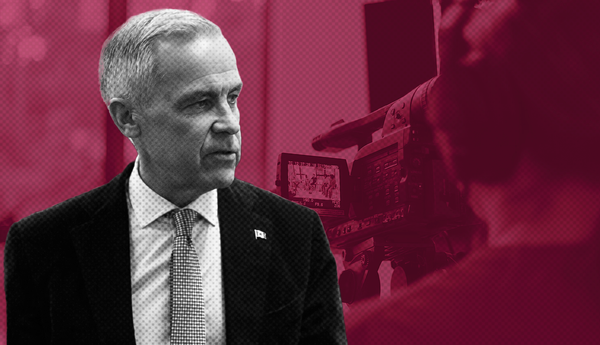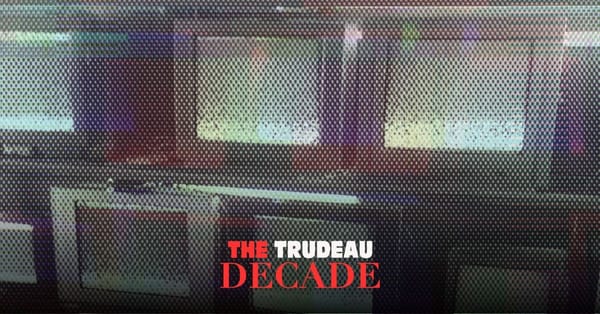Last week, a group of more than 50 media outlets, unions, employer associations and other organizations, representing pretty much every main player in the industry, sent a letter to Prime Minister Justin Trudeau calling for the federal government to take action against the online harassment of journalists.
The main demand outlined in the letter however, was addressed to the police, with the authors writing: “We are asking police forces to take several immediate steps to address the current incidents and to work with our organizations to combat abuse of journalists and all victims of online hate and harassment.”
This is a mistake.
The ongoing harassment is being disproportionately experienced by racialized and/or women journalists. As such, calling for the police to stop it is an incredible display of ignorance of how racism and patriarchy operate within state security forces. Plus, as agents of the state, the police have never been interested in protecting free speech or a free press. At best, they’re ineffective at doing so. At worst, they’ve harassed and spied on journalists, prevented them from doing their jobs, and even put guns in their faces.
The only way to read this letter is to see it as a call to give police more power and resources (which is what Trudeau ended up mentioning in his response letter this week), including the ability to access social media platforms. Guess what that means for those of us who are already marginalized? Things will get worse. Journalists that criticize the state will always be considered a threat, not a group to safeguard.
In a few words, my reaction to this letter is a giant, “Wow, thanks guys.”
It’s easy, but lazy, for media organizations to reach for the police as a solution to problems. What would be more difficult, but ultimately more effective, is these organizations taking a closer look at why the harassment of journalists is rising, determining what they have the power to do in response and then doing it.
Recently, I argued that the media establishment (managers, owners, etc.) have a lot to account for in this discussion. In this article, I’m going to list a few media contributors to the rising harassment, and explain what the major media organizations that signed on to the letter have the power to do about it, if they really care about fighting back.
Media Concentration
The problem: When someone who is already skeptical of mainstream media sees the same Canadian Press story run across competing media outlets, it can look like a conspiracy. As news agencies shrink and content is recycled across platforms, people find less diversity in their news, and grow more cynical. While most people won’t react to this by running head-first toward conspiracy theories, it’s easy to see how someone would.
Will the police stop media concentration? No.
Solution: Call on the government to break up monopolies like Postmedia, and make mergers that would bring all media properties in a city or province under one owner illegal.
Challenges: Well, aside from the fact that Postmedia signed this letter (which is extremely funny, considering that some of their columnists have been gunning for a culture war of this sort for years), the owners of the largest outlets would never call on the government to do this, and instead would do their best to prevent it.
Distance Between Journalists And Communities
The problem: When a local journalist is someone rooted in your community, who you can get to know, it’s more difficult for them to be demonized. But, thanks to media concentration, it’s likely that you’ll never encounter local journalists in real life, as they’re pushed further from the communities they claim to serve, and your local paper (if you even have one) is filled with recycled content from thousands of kilometres away. When far-right conspiracy organizers are demonizing the media, they can easily point to small errors that are the result of this trend. It breeds cynicism, and is a cancer for journalism.
Case in point: I was speaking with healthcare workers in Saskatchewan recently, and they told me that their local newspapers were all fake news. Why, I asked? Because their reports were wrong, they replied, and therefore lies. They saw the devastation of the pandemic up close, but they didn’t see their experiences reflected in the daily newspaper. They felt that journalism was too far away from them, and kept getting their issues wrong. Not because of a journalist simply being overworked, but because of a conspiracy.
Will the police help Canadians feel closer to journalists? No.
The solution: Pour money into local news; call on the government to double funding to CBC/Radio Canada for local radio news; collect a local news levy through municipal taxes and use the money to fund local worker-managed media outlets; hire more journalists who didn’t go to j-school.
Challenges: It’s difficult to profit off of local news in Canada, and most of the signatories on the list don’t actually care about it if it threatens their bottom line.
The For-Profit Model
The problem: News in Canada is dominated by corporations driven to make profits. This has an impact on everything in the industry, including pushing news agencies to focus on issues with an eye to their bottom lines. Clickbait, stories that seem frivolous or silly, paid advertorials, paywalls that make far-right news sources easier to access than credible ones — all of these decisions feed into the cynicism that so many Canadians feel toward the news industry. I think journalists understand this, but hope their work can transcend this cynicism. The problem is that it can’t: No blockbuster investigation can make up for the fact that readers can see when an outlet is more focused on its revenue than the quality of its journalism.
Will the police make journalism non-profit? No.
The solution: Calling on the government to seize for-profit outlets and hand them over to the workers to run (or, waiting until the owners are bankrupt, as was the case for CN2i in Quebec, also a signatory of the letter); more non-profit news agencies; more journalism that demonstrates the connections between profit and weakened reporting.
Challenges: The vast majority of the signatories on this list are in the game to make money. They will let us take it from their cold, dead hands.
Lack Of Job Security
The problem: As full-time journalism positions continue to vanish in Canada, the industry is increasingly made up by people like me: freelancers who work for almost no money and can be disposed of in an instant. This means that there’s an entire class of journalists for whom there’s absolutely no formal mechanism to address online harassment. Then, there are journalists who work on endless freelance or temporary contracts, always at risk of losing their jobs. If an employer thinks that someone is a troublemaker, they will be fired.
The far right understands how vulnerable this reality makes certain journalists, and chooses their targets wisely. For example, in 2018, while thousands of people were telling me to commit suicide because of a tweet, Maclean’s issued a press release condemning me, and telling readers I had merely freelanced for them, not been an employee. We’re not so far away from that.
Will the police help improve job security? No.
The solution: Stop misclassifying journalists as freelancers, and give them the job security they deserve under various employment standards legislation; include harassment provisions in freelance contracts; include provisions that allow journalists to have more freedom to express themselves off-hours, including a guarantee that they can’t be sanctioned if an online mob targets them and mobilizes to get them fired.
Challenges: Most employers want to be able to control their workers off-hours; employers benefit from the low-cost and flexibility that freelancers offer; a lack of job security can be used to control workers on the job, too.
Poor Crisis Management
The problem: When in a crisis, media management don’t actually care about the individuals at the bottom. If it’s more politically expedient to fire someone, they will. This latest round of harassment had three main targets who were all more or less easy for management to defend, as the vile threats weren’t in response to some controversial comment or point of view from them, but rather merely because of their gender and/or race. As a result, their employers had their backs from the start. But make a joke about your premier’s son having boring sex? You’ll be let go in a flash.
The far right knows they can get people fired or harass them into silence, and so they constantly use these tactics. It’s far too late to put that cat back into the bag. Even if, for example, Maclean’s never issues the sort of press release they did about me again, they can’t reverse that they did it, and it helped to build the far right’s arsenal of tactics.
Will the police stop management from burning their workers? No.
Solution: Management must refuse to bow to far-right pressure.
Challenges: There will inevitably be journalists who say something their employers refuse to agree with, and we’ll see them abandoned by their bosses.
Lower Quality Of Journalism
The problem: There’s a crisis of quality in journalism. Daily reports tend to go no deeper than one or two official comments, and only maybe including the voice of an individual impacted. Longer features and investigations are locked behind paywalls. Throughout the pandemic, 90 per cent of daily reporting was just regurgitating already-posted numbers from official sources. This is toxic to public trust in journalism, but it’s also the natural result of expecting journalists to write more than ever before to save their employers money. Corners are routinely cut, and the quality of media suffers as a result.
Plus, having fewer journalists means that the ones who are working are more likely to become targets of hatred. For example, rather than having 20 people in the industry covering a specific issue, you only have a handful. As a result, it’s easier for the far right to then target that handful and demonize them.
Will the police help improve the quality of reporting? No, and worse, they’re one of the principal contributors to, and beneficiaries of, the status quo, as police comments and press releases are regularly republished as news.
The solution: Hire more journalists. While there’s probably a deeper structural analysis that needs to be done here, at the bare minimum, get more people into workplaces to help with research, brainstorming and diversifying content.
Challenges: Because this issue is deeply linked to all the others named, management and owners are unlikely to do anything too radical to change course.
Smaller Journalist Teams
The problem: Years of newsroom cuts also mean that journalists are often going out in the field with fewer people around them than before, including at potentially hostile events. This makes it easier for people to harass journalists on camera, with no one around to run interference. As a result, smaller teams and individual journalists, particularly when they’re women, are far more vulnerable to street harassment.
Will the police stop street harassment? No, but they might promise to pay more attention to it.
Solution: Don’t allow journalists to report alone at hostile events.
Challenges: For-profit media corporations see every extra journalist as a dollar lost, and often try to justify smaller crews by saying they aren’t necessary. Sadly, we’re far more likely to see underpaid security agents added to news teams than journalists.
This list contains just the items that pertain to the newsroom. There are many other things that can be done to protect the safety of journalists, and you can read about those on my Substack.







